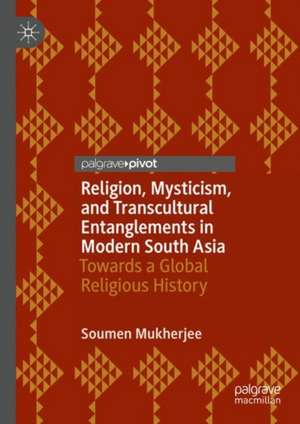Religion, Mysticism, and Transcultural Entanglements in Modern South Asia: Towards a Global Religious History
Autor Soumen Mukherjeeen Limba Engleză Hardback – 13 apr 2024
Preț: 321.54 lei
Nou
Puncte Express: 482
Preț estimativ în valută:
61.53€ • 64.37$ • 51.11£
61.53€ • 64.37$ • 51.11£
Carte tipărită la comandă
Livrare economică 02-16 aprilie
Preluare comenzi: 021 569.72.76
Specificații
ISBN-13: 9783031496363
ISBN-10: 3031496361
Ilustrații: XVII, 201 p. 2 illus.
Dimensiuni: 148 x 210 mm
Greutate: 0.41 kg
Ediția:2024
Editura: Springer Nature Switzerland
Colecția Springer
Locul publicării:Cham, Switzerland
ISBN-10: 3031496361
Ilustrații: XVII, 201 p. 2 illus.
Dimensiuni: 148 x 210 mm
Greutate: 0.41 kg
Ediția:2024
Editura: Springer Nature Switzerland
Colecția Springer
Locul publicării:Cham, Switzerland
Cuprins
1 Mystics, scholars, and spiritual cosmopolitans in modern South Asia: An introduction.- 2 The quest for ‘medieval mysticism’ and Vaiṣṇava Vedānta: The Tagore-Sen-Underhill circle and the Chicago moment of Mahanambrata Brahmachari.- 3 Islam, yoga, and sāmyavāda: Allama Iqbal and Kazi Nazrul Islam on nationalism, metaphysics, and existence.- 4 Theosophists, yogīs, and pacifism in troubled times: Bhagavan Das, Nicholas Roerich, and Gopinath Kaviraj on humanity and realms of transcendence.- 5 Pilgrims and their cosmopolitan itineraries: The many worlds of Subhas Chandra Bose, Dilip Kumar Roy, andYogi Krishnaprem.- 6 From interwar idealism through ‘perennial philosophy’: Concluding reflections.
Notă biografică
Soumen Mukherjee teaches History at Presidency University in Kolkata. He is the author of Ismailism and Islam in Modern South Asia: Community and Identity in the Age of Religious Internationals (2017).
Textul de pe ultima copertă
“An insightful study of the spiritual quest undertaken by an impressive array of South Asian intellectuals who reappraised the very meaning of religion. Far from being a mode of inward-looking cultural defense, Soumen Mukherjee convincingly interprets mysticism and spirituality as a cosmopolitan pursuit by creative thinkers delving into devotional traditions of India’s past while responding to global challenges of the early twentieth century.”
— Sugata Bose, Gardiner Professor of Oceanic History and Affairs, Harvard University
“A detailed and erudite study of the way in which mysticism and spirituality came to dominate Indian forms of selfhood and self-making from the first half of the twentieth century. Part of a global debate spanning Asia, Europe, and America, interest in the esoteric and metaphysical distinguished Indian thinkers from their peers in other countries while nevertheless joining them in conversation to make for a truly global debate on the meaning and freedom of the self.”
— Faisal Devji, Professor of Indian History, University of Oxford and Fellow, St Antony’s College
“In India, as in many other Asian contexts, claims of modernity have sat uneasily with histories and traditions of mysticism and spirituality… This outstanding book helps us break out of such unproductive dichotomies by focusing on religious and cultural discussions in India in the early twentieth century… Yet, this riveting book is neither conventionally parochial nor fashionably global— it hypostasizes ‘spiritual cosmopolitans’ situating thinkers within contexts of transregional religious movements and networks.”
—Samita Sen, Vere Harmsworth Professor of Imperial and Naval History, University of Cambridge and Fellow, Trinity College
This book explores the location of spirituality and mysticism in modern Indian religious and intellectual life. It examines select personalities and their ideas since the early twentieth century, their role in the interwoven spheres of socio-religious and political thought, and in burgeoning spiritual imaginaries, often at the intersection of academic and public discourse. As part of a global ecumene connected by affective bonds, these spiritual cosmopolitans often defied binary frameworks (East/ West; imperial core/ periphery; colonizer/ colonized), and in the upshot reappraised and recast the very concept of religion in response to overarching ‘this-worldly’ exigencies.
Soumen Mukherjee teaches History at Presidency University in Kolkata. He is the author of Ismailism and Islam in Modern South Asia: Community and Identity in the Age of Religious Internationals (2017).
— Sugata Bose, Gardiner Professor of Oceanic History and Affairs, Harvard University
“A detailed and erudite study of the way in which mysticism and spirituality came to dominate Indian forms of selfhood and self-making from the first half of the twentieth century. Part of a global debate spanning Asia, Europe, and America, interest in the esoteric and metaphysical distinguished Indian thinkers from their peers in other countries while nevertheless joining them in conversation to make for a truly global debate on the meaning and freedom of the self.”
— Faisal Devji, Professor of Indian History, University of Oxford and Fellow, St Antony’s College
“In India, as in many other Asian contexts, claims of modernity have sat uneasily with histories and traditions of mysticism and spirituality… This outstanding book helps us break out of such unproductive dichotomies by focusing on religious and cultural discussions in India in the early twentieth century… Yet, this riveting book is neither conventionally parochial nor fashionably global— it hypostasizes ‘spiritual cosmopolitans’ situating thinkers within contexts of transregional religious movements and networks.”
—Samita Sen, Vere Harmsworth Professor of Imperial and Naval History, University of Cambridge and Fellow, Trinity College
This book explores the location of spirituality and mysticism in modern Indian religious and intellectual life. It examines select personalities and their ideas since the early twentieth century, their role in the interwoven spheres of socio-religious and political thought, and in burgeoning spiritual imaginaries, often at the intersection of academic and public discourse. As part of a global ecumene connected by affective bonds, these spiritual cosmopolitans often defied binary frameworks (East/ West; imperial core/ periphery; colonizer/ colonized), and in the upshot reappraised and recast the very concept of religion in response to overarching ‘this-worldly’ exigencies.
Soumen Mukherjee teaches History at Presidency University in Kolkata. He is the author of Ismailism and Islam in Modern South Asia: Community and Identity in the Age of Religious Internationals (2017).
Caracteristici
Sheds light on the location of mysticism and spirituality in modern Indian religio-intellectual life Explores well-known as well as lesser known understudied figures and their ideas Brings to relief at once the global cosmopolitan flows and specific regional aspects of this history
